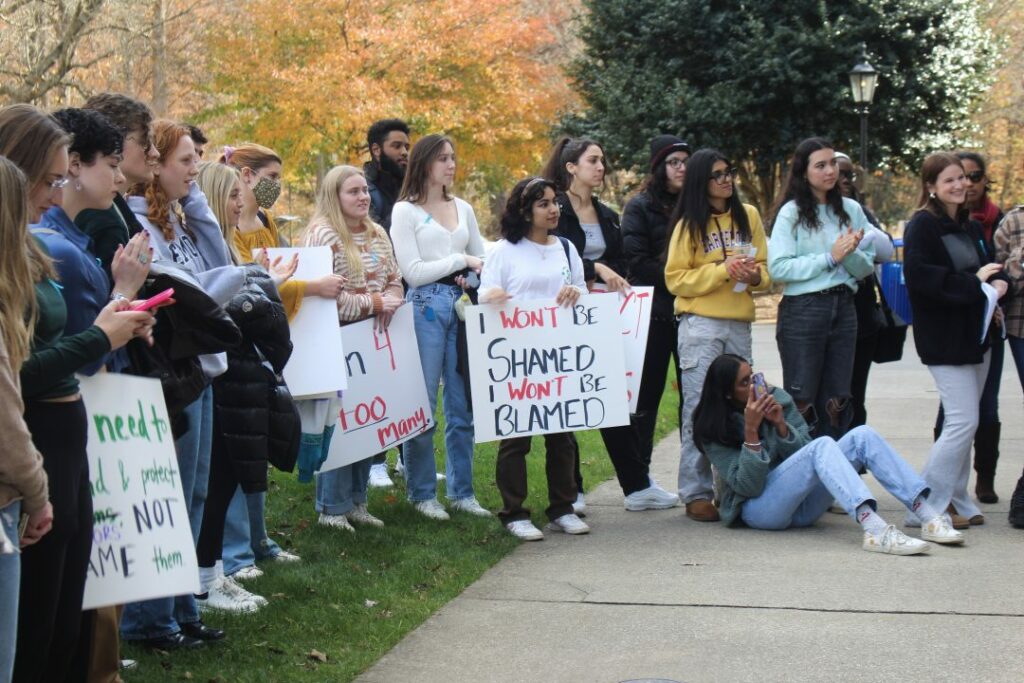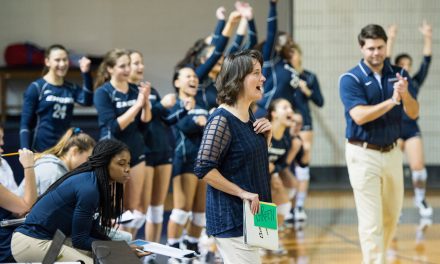Content Warning: This article contains references to sexual assault.
On March 3, 2023, I was sexually assaulted and raped. It was someone I knew and previously trusted. It was violent and clear. Despite this, I did not pursue a Title IX resolution. I was not uninformed or afraid; I was exhausted.
I was exhausted and already waiting for a decision from my previous formal Title IX case at Emory University. This case dragged on for nearly a year. I filed a formal complaint in March 2022, our hearing was in January 2023 and he appealed the decision a month later. I spent 234 business days begging the University to help. For those who are unfamiliar, Title IX offers multiple resolution processes, but a formal resolution includes an investigation, hearing and opportunity for appeal. Each stage is a perfectly choreographed series of impersonally measured business days.
I refused to do it again.
My year with the Department of Title IX consisted of me telling my story over and over again — justifying my sexual harassment and recounting my trauma to a revolving door of advocates, coordinators and investigators. My case was transferred to four different advocates, three coordinators and two investigators each time without my knowledge. Each step demands the complete participation of the victim, the complainant. While maintaining my standing as a student, I was struggling to understand my rights as a victim. It was traumatizing, and it failed to help me reconcile the incident itself. Survivors of sexual assault deserve to have their stories told, and we deserve closure. The system, designed to bring about justice and resolution, only perpetuated my sense of helplessness.

Students hold signs and listen to speeches after marching to the Administration Building. (Anna Schwartz/Contributing Photographer)
After an entire calendar year of measuring my life in business days, my harasser was found responsible, both in the original determination and in his appeal. The University suspended him for his actions. I won my case, but I am still not sure if it was worth it. I do not regret my choice, but when I think about my assault and all the events surrounding it, I fixate on Title IX as a symbol of institutional injustice.
I still struggle to grapple with the reality of my experience. Over a year later, my heart still skips a beat whenever I hear an Outlook notification. I still remember the personal and confidential emails that guaranteed frustration or anxiety. I still remember the seemingly endless emails outlining numerous delays or meaningless updates followed by weeks of silence from the Department of Title IX.
The department has worked to ensure internal stability in the year since my case. In addition to hiring more administrators and investigators, the staff has also worked to streamline the coordinator position. University President Gregory Fenves previously told the student body that the Department of Title IX is working toward providing survivors with appropriate support. But this promise does not erase my year of sleepless nights and panic attacks.
Even though I won, Title IX failed me. Emory failed me. I was forced to become my own advocate and navigate the confusing legalese of my own sexual assault. Even Emory’s Office of Respect, dedicated to supporting survivors of interpersonal violence, failed as a truly confidential resource. Without my knowledge or permission, the Office of Respect initiated a threat assessment based on information I shared in confidence. This was not an assessment of my harasser’s threat to me, but rather an assessment of his threat to the University. The threat assessment confirmed that I had already notified campus officials, against the respondent’s explicit threat of additional violence.
This was a clear demonstration of the University’s commitment to itself as an institution over the safety of the students. Although the threat assessment team did not share the details of my case outside of their review, to me they were unknown administrators that openly discussed the most intimate details of my life despite my objections and safety concerns.
In this matter, the Director of the Office of Respect Emily Palmieri and Senior Vice President and Dean of Campus Life Enku Gelaye assured me during in-person conversations that Emory is taking every possible measure to protect the safety and well-being of its students.
This is why, in the aftermath of my rape and sexual assault last year, I chose to not pursue Title IX again. Given my past experience, I was unwilling to engage with the department in any capacity: supportive measures, informal resolution or even a formal report. I instead elevated my case to the DeKalb County Superior Court, where I was granted a protective order. Protective orders, like restraining orders, prohibit the accused person from threatening the physical safety of the petitioner. This is similar to another supportive measure that Title IX offers: Mutual No Contact Orders. I previously obtained a mutual no contact order. There were over a dozen reported violations, yet the Department of Title IX was unable to enforce the order. Despite issuing the orders, the department defers enforcement to the Office of Student Conduct. In October 2023, there were discussions that the adjudication would be moved under the Department of Title IX; however, I have received no confirmation of this change occurring or not.
With less than eight weeks until graduation, I ask myself why I still care about something that happened a year ago. The reality is that I still live with this experience, and my sexual assault changed me irrevocably. I avoid places that remind me of him, and sometimes, I am overcome with an inexplicable fear that something terrible is about to happen. I lost close friends in my grief, and I found my best ones in it too. I learned what it means to advocate for myself, and I learned that it is okay to leave an environment that no longer feels safe or supportive. I lost over a year of college to the Title IX process, and I am choosing to graduate a year early for the same reason. Two years ago, it was the bravery of other survivors that assured me that I too would be OK one day. And for this reason, I feel compelled to share my story.
For those who resonate with my experience, I might not know you personally, but your story is powerful, and it is your own. No coordinator or determination can take that away. For those considering engaging with the Department Title IX or other legal action, it is OK to be afraid. As hard as it will be, remind yourself it’s OK to ask for support and grace. As someone who chose Title IX, the courts and silence, I understand the weight of this decision. It is the loneliest position in the world, but rest assured, you have friends who love and support you. You have the right to closure, whether it is through the Title IX process or in personal resolution. Whatever you choose, it makes sense and is valid. There’s no right path in any of this. Take care of yourself, and know that you are deserving of kindness and compassion.
If you or someone you know experienced sexual assault, you can access Emory’s Title IX resources at 404-727-0541 or https://equityandcompliance.emory.edu/title-ix/index.html and the Office of Respect at https://respect.emory.edu/ or its hotline 24/7 at 404-727-1514. You can reach the RAINN National Sexual Assault hotline 24/7 at (800) 656-4673 or https://hotline.rainn.org/online. You can reach the Atlanta Grady Rape Crisis Center crisis hotline 24/7 at (404) 616-4861 or gradyrapecrisiscenter@gmh.edu and the Decatur Day League Sexual Assault Care and Prevention crisis hotline 24/7 at (404) 377-1428.
Rose Danuser (24C) is from Austin, Texas.



